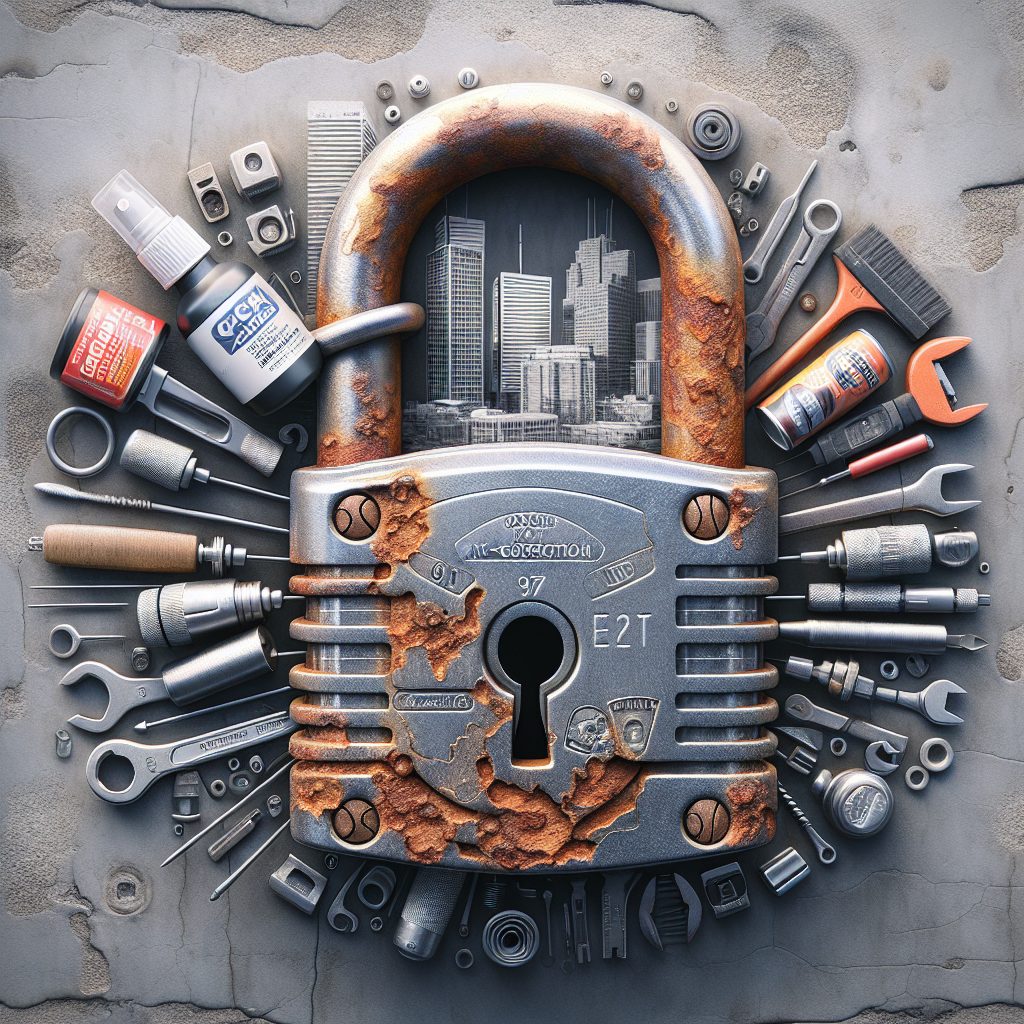Treating Lock Corrosion: Solutions in Toronto
Lock corrosion is an issue that many individuals in Toronto and beyond have experienced at some point in their lives. Corrosion occurs when the metal parts of a lock, such as the pins and springs, become damaged or deteriorate due to exposure to moisture, chemicals, or other environmental factors.
The impact of lock corrosion can be significant, as it can result in the lock becoming difficult to operate or even completely non-functional. This can be a major inconvenience for individuals who rely on their locks to secure their homes, offices, or vehicles. Furthermore, corrosion can also compromise the security of these spaces, as a corroded lock may be easier to bypass or pick.
In the upcoming sections, we will explore the various solutions available for treating lock corrosion in Toronto. From preventive measures to professional locksmith services, we will discuss key takeaways that individuals should be aware of when it comes to protecting their locks from corrosion or addressing existing corrosion issues. By implementing these solutions, individuals can ensure the longevity and functionality of their locks, providing peace of mind in a world where security is of utmost importance.
Key Takeaways
1. Treating lock corrosion is crucial to maintain the functionality and durability of locks in Toronto.
2. Moisture and humidity are major contributors to lock corrosion, making it essential to protect locks from the elements.
3. Regular cleaning and lubrication of locks can help prevent corrosion and extend their lifespan.
4. In cases of severe corrosion, professional locksmiths in Toronto offer specialized solutions such as lock disassembly and chemical cleaning.
5. Taking proactive measures, such as applying protective coatings or installing weatherproof covers, can significantly reduce the risk of lock corrosion.
How to Treat Lock Corrosion in Toronto?
Understanding Lock Corrosion
Lock corrosion is a common issue that many Toronto residents face due to the city’s high humidity levels and extreme weather conditions. Corrosion occurs when the metal components of a lock are exposed to moisture, leading to the formation of rust. Not only does lock corrosion affect the functionality of locks, but it also compromises the security of your property.
The Importance of Treating Lock Corrosion
Addressing lock corrosion is essential to ensure the longevity and effectiveness of your locks. Ignoring corroded locks can result in complete lock failure, leaving your property vulnerable to break-ins and compromising the safety of your belongings. Treating lock corrosion promptly is crucial to avoid costly repairs or replacements.
Identifying Lock Corrosion
To treat lock corrosion effectively, it’s important to be able to identify its early signs. Look out for any discoloration, flaking, or rust on the lock’s surfaces. Difficulty in turning the key or a sticky lock mechanism are also indications of lock corrosion. Regularly inspect your locks to catch corrosion in its initial stages.
Preventing Lock Corrosion
Taking preventive measures can help minimize the risk of lock corrosion in Toronto. Here are a few tips to prevent lock corrosion:
– Apply a protective lubricant: Regularly lubricate your locks with a moisture-resistant, graphite-based lubricant. This creates a protective barrier against moisture and reduces the chances of corrosion.
– Keep locks dry: Avoid exposing your locks to excessive moisture by ensuring they are shielded from rain, snow, or any other form of water. Consider installing door canopies or awnings to provide extra protection.
– Use corrosion-resistant locks: When choosing new locks for your property, opt for those made of materials such as stainless steel or brass, which are less prone to corrosion.
– Maintain humidity levels: Use dehumidifiers or moisture-absorbing products to maintain optimal humidity levels inside your home. Lower humidity reduces the likelihood of lock corrosion.
Effective Solutions for Treating Lock Corrosion
In Toronto, various efficient solutions can help treat lock corrosion and restore your locks’ functionality. Here are some reliable options:
– Professional lock maintenance: Hiring a reputable locksmith in Toronto can ensure proper maintenance and treatment of corroded locks. They have the expertise and specialized tools to clean, lubricate, and repair locks affected by corrosion.
– DIY cleaning and lubrication: For mild cases of lock corrosion, you can try cleaning the affected areas using a rust dissolver or vinegar. After cleaning, apply a suitable lock lubricant to prevent further corrosion.
– Lock replacement: In severe cases where the lock is extensively corroded or damaged, replacing the lock may be the best solution. Consult a professional locksmith to help you choose a lock suitable for your security needs.
Final Tips for Treating Lock Corrosion:
1. How often should locks be inspected for corrosion?
Regularly inspect your locks every few months to catch corrosion early.
2. Are there specific lubricants recommended for treating lock corrosion?
Yes, using graphite-based lubricants is highly recommended for their moisture-resistant properties.
3. Can lock corrosion be prevented entirely?
While complete prevention is challenging, following preventive measures and proper maintenance can significantly reduce the risk of lock corrosion.
4. Is it possible to restore severely corroded locks?
In most cases, severely corroded locks may need to be replaced to ensure optimal security and functionality.
5. Should I seek professional help for treating lock corrosion?
If you are unsure about handling lock corrosion on your own or if the lock is extensively corroded, consulting a professional locksmith is advisable.
Frequently Asked Questions
1. What causes lock corrosion?
Lock corrosion can be caused by various factors, including exposure to moisture, lack of lubrication, and the presence of corrosive chemicals or substances in the vicinity.
2. How can I prevent lock corrosion?
To prevent lock corrosion, it is important to keep the lock clean and dry. Regular lubrication with a corrosion-resistant lubricant and avoiding the use of harsh chemicals near the lock can also help reduce the risk of corrosion.
3. Can I treat lock corrosion myself?
While minor cases of lock corrosion can be treated by individuals, it is recommended to seek professional locksmith services for more severe or complex cases to ensure the lock is properly repaired or replaced.
4. Are there any home remedies for treating lock corrosion?
Some common home remedies for treating lock corrosion include using vinegar or baking soda to remove rust, applying a rust converter or penetrating oil to loosen the corroded parts, and using a wire brush or sandpaper to mechanically remove corrosion.
5. Are there any commercial products available for treating lock corrosion?
Yes, there are several commercial products available specifically designed for treating lock corrosion. These products often contain rust dissolvers, lubricants, or protective coatings to help restore the lock’s functionality and prevent further corrosion.
6. Can lock corrosion damage the entire lock mechanism?
Lock corrosion, if left untreated, can eventually damage the entire lock mechanism. Corrosion can cause the lock parts to become stuck or cease functioning properly, leading to difficulty in unlocking or locking the device.
7. How do professional locksmiths treat lock corrosion?
Professional locksmiths have specialized tools and expertise to treat lock corrosion effectively. They may disassemble the lock, clean all the components, remove rust, apply lubricants, and make any necessary repairs or adjustments to ensure the lock functions smoothly.
8. How long does it take to treat lock corrosion?
The time required to treat lock corrosion can vary depending on the severity of the corrosion and the complexity of the lock mechanism. Simple cases may take a few minutes to an hour, while more extensive corrosion may require several hours or even multiple visits by a locksmith.
9. Can lock corrosion be prevented in high-humidity environments?
Preventing lock corrosion in high-humidity environments can be challenging but not impossible. Regular maintenance, such as applying corrosion-resistant lubricants and ensuring proper ventilation, can help minimize the effects of humidity on lock corrosion.
10. Is lock corrosion covered by insurance?
Whether or not lock corrosion is covered by insurance depends on the specific terms and conditions of your policy. Some insurance policies may cover lock damage due to corrosion, while others may require additional coverage specifically for this type of damage.
Final Thoughts
Treating lock corrosion is essential to ensure the security and functionality of your locks in Toronto. By addressing lock corrosion promptly and taking preventive measures, you can prolong the lifespan of your locks and avoid costly replacements. Whether you opt for DIY solutions or seek professional locksmith services, making lock maintenance a priority will help keep your locks in optimal condition and provide peace of mind.
Remember, regular inspections and maintenance can help identify and address lock corrosion before it becomes a significant issue. Additionally, consulting with experienced locksmiths or manufacturers for specific recommendations on lock care and corrosion prevention can further enhance the longevity and effectiveness of your locks in Toronto.






Recent Comments